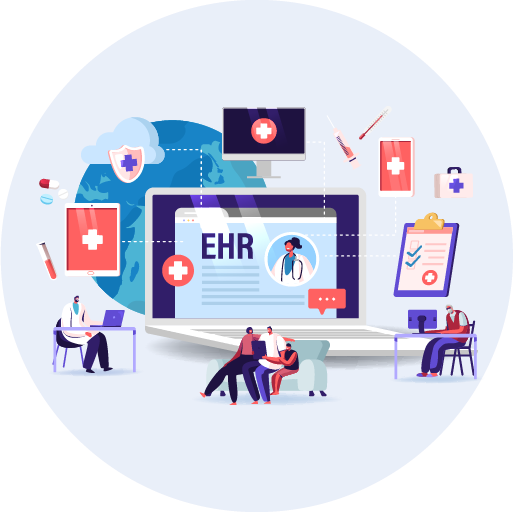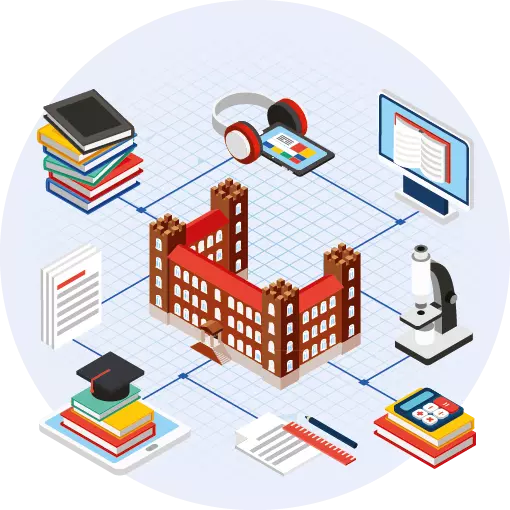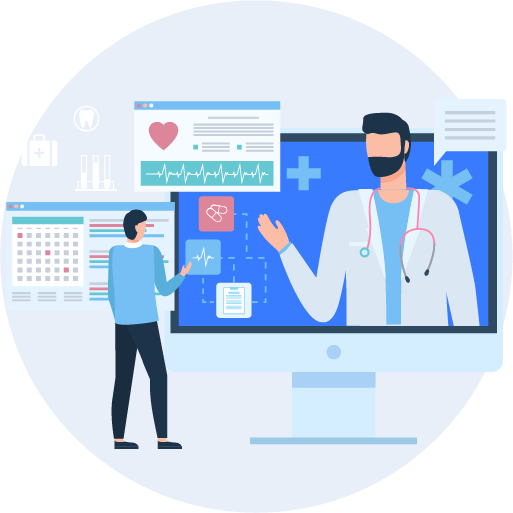Healthcare

Making patients the center of our healthcare ecosystem
The healthcare industry is embracing Digital Transformation in a big way to meet the significant challenges it faces today. Traditional norms of healthcare delivery, rigid protocols, rigid restrictions on patient data have been revisited, are being overhauled and redesigned.
Patients are now ‘consumers’ and expect healthcare to be delivered in the comfort of their homes. Hospitals have evolved from being a physical structure to a network of digitally connected distributed entities for diagnostics, remote consultations, specialist treatments, residential post-operative care, door delivery for medications, and more.
Connected healthcare is transforming patient care
Adopting any new technology in the healthcare world has been perceived to be slow due to the strict governance around data protection, compliance, and the long-drawn processes around testing new healthcare options. This is, of course, to ensure that patient safety is not compromised in any manner. While adoption of disruptive technologies was slow initially, today, the benefits far outweigh the concerns. Remote patient monitoring using IoT and faster diagnosis due to real-time data capture through monitoring are critical factors enabling smart healthcare.
Partner with us to overcome your IT challenges.
API Implementation Solutions for EHR (Electronic health record) compatibility
A fully connected health system that enables patients, caregivers, and healthcare providers to access, exchange, and use electronic health information is vital.
The EHR interoperability initiatives should be patient-centric and revolve around improving patient care. The chief objective should be to safely and securely exchange patient information across the healthcare ecosystem where interoperability serves as the linchpin.
It’s easy to get lost in the shuffle, but with the right solutions partner, you can surely adopt the best practices to shift your focus and achieve EHR/EMR interoperability. No matter how far you are on the road to interoperability, we will take you there with the necessary solutions


Health Systems Robotic Process Automation (RPA)
As a Healthcare provider, you deal with endless paperwork, updating data in multiple systems and administrative tasks that takes your attention away from patient care. Robotics Process Automation in healthcare eliminates these repetitive tasks, enhances operational efficiency, reduces cost and allows care providers to focus on the patient. With Process Automation handled by bots, Robotic Process Automation enhances data confidentiality.
Activities that lend themselves to RPA include:
- Scheduling & Managing patient appointments
- Collating data from different silos for unified access
- Manage inventory
- Billing & Processing claims
Virtual Consultations with TeleHealth Networks
TeleHealth Solutions lets patients schedule appointments, join video virtual consultations from the device of their choice, without the need to download any software or plugins. Providers use technology they already have, such as telehealth carts, traditional video conferencing products, Skype, Microsoft Teams, or Google Meet. The solutions include flexible APIs to integrate with EMRs/EHRs.
Telehealth has immense potential and can improve outcomes significantly if efforts are made to expand access to care. Physicians are already reporting burnout as work stress continues. Telehealth programs, when implemented correctly, can bridge the gaps in healthcare now and forever for all. Not to forget the immense cost savings virtual consultations can lead to.
We can help your healthcare facility transform into an agile, robust network of digitally connected distributed entities to open doors to new and exciting opportunities in telehealth. Our domain knowledge and technology expertise help us work closely with stakeholders to meet the many challenges of care delivery in the telehealth sector.


Cloud-based Lab Information Management Systems (LIMS)
LIMS Solutions are critical in helping laboratories to process samples from receipt through storage and usage. It helps staff save time by automatically documenting details about every sample.
The primary role of Lab Information Management System is to remove blocks that stand in the way of attaining operational efficiency. A modern LIMS facilitates workflow automation and management, enables data analysis, and supports regulatory compliance. It also plays a big role in facilitating audit trails and integrates with instruments, devices, and systems. But in order to ensure that the LIMS plays its part perfectly well within your lab environment, it needs to be implemented, integrated, and validated properly. You need to also plan for its maintenance and upgrade early on.
Moving to the cloud is an important decision and we can help you with everything you need with a highly systematic approach to laboratory information management.